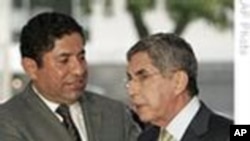<!-- IMAGE -->The standoff continues between deposed Honduran President Manuel Zelaya and the de facto government that replaced him last month. With the support of regional leaders, the president is determined to return to his country and his office, de facto leader Roberto Micheletti vows to refuse him entry, and tensions around the country remain high.
Out of the public eye, however, the first small steps toward a settlement are being made and given the high stakes, the parties should commit themselves to a successful conclusion.
Under the mediation of Costa Rican President Oscar Arias, significant progress has been made in creating a foundation for a peaceful resolution to the crisis, one that adheres to the principles of the Inter-American Democratic Charter and restores constitutional and democratic order to Honduras. Mr. Zelaya is to be commended for his cooperation in the process, agreeing to help settle the crisis by moving up the scheduled November presidential elections, taking part in a government of reconciliation and abandoning his effort to hold a referendum to rewrite the constitution in a way that would allow him to run for a third presidential term.
The talks now have been suspended until July 22 as both sides reassess their positions. As they do this, the United States urges them to give President Arias' diplomatic efforts more time. A breakdown in negotiations risks the further isolation of the de facto regime, much to the detriment of Honduras, one of the poorest countries in the hemisphere. President Zelaya's threats to forcibly re-enter the country at this time could cause a repeat of the bloodshed seen when he attempted to land at the Tegucigalpa airport as hundreds of his supporters confronted security forces surrounding the airstrip.
The United States calls on all parties to reflect on the progress made in the talks so far and to stay the course. It is also vital that Honduras's neighbors and other interested parties reaffirm their support for the Arias talks, remain mindful of the principles of non-intervention and self-determination, avoid inciting violence, and express their solidarity for the well-being of the Honduran people.
Out of the public eye, however, the first small steps toward a settlement are being made and given the high stakes, the parties should commit themselves to a successful conclusion.
Under the mediation of Costa Rican President Oscar Arias, significant progress has been made in creating a foundation for a peaceful resolution to the crisis, one that adheres to the principles of the Inter-American Democratic Charter and restores constitutional and democratic order to Honduras. Mr. Zelaya is to be commended for his cooperation in the process, agreeing to help settle the crisis by moving up the scheduled November presidential elections, taking part in a government of reconciliation and abandoning his effort to hold a referendum to rewrite the constitution in a way that would allow him to run for a third presidential term.
The talks now have been suspended until July 22 as both sides reassess their positions. As they do this, the United States urges them to give President Arias' diplomatic efforts more time. A breakdown in negotiations risks the further isolation of the de facto regime, much to the detriment of Honduras, one of the poorest countries in the hemisphere. President Zelaya's threats to forcibly re-enter the country at this time could cause a repeat of the bloodshed seen when he attempted to land at the Tegucigalpa airport as hundreds of his supporters confronted security forces surrounding the airstrip.
The United States calls on all parties to reflect on the progress made in the talks so far and to stay the course. It is also vital that Honduras's neighbors and other interested parties reaffirm their support for the Arias talks, remain mindful of the principles of non-intervention and self-determination, avoid inciting violence, and express their solidarity for the well-being of the Honduran people.













